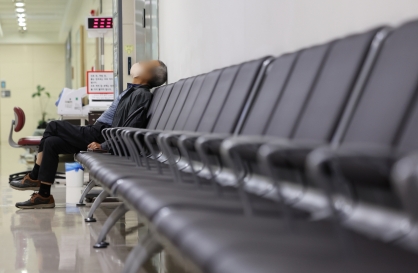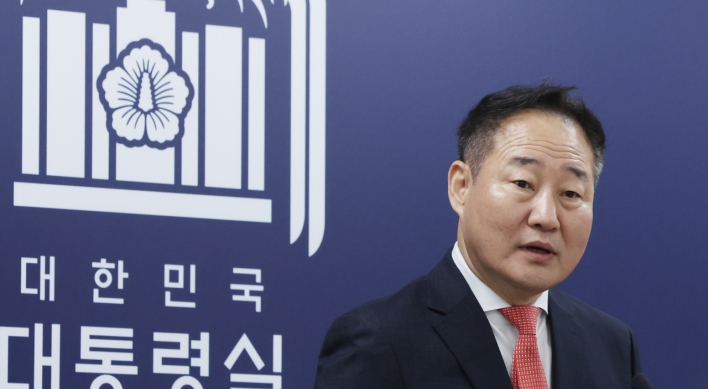South Korea's financial watchdog is seeking to curb savings banks' lending to households as part of efforts to tackle the nation's soaring household debt, officials said Tuesday.
Savings banks' loans to the household sector have been rising at a rapid clip since last year due to their aggressive marketing activities for borrowers with poor credit in South Korea already gripped by high household indebtedness.

According to the officials, the Financial Supervisory Service is considering toughening rules on the financial soundness of savings banks by having them put aside more reserves for risky assets and strengthening regulations on overdue loans.
"With savings banks' credit loans to households rising fast, financial authorities are keeping close tabs on the situation and mulling tightening prudential supervision to prepare for the worsening of their financial health," a source said.
Tougher prudential regulation requires savings banks to conduct loan screenings more thoroughly, which usually helps limit the pace of lending.
Since July, the FSS has also been conducting on-spot inspections of 14 savings banks with high portions of credit loans to households over their lending rate calculations and business practices of hiring loan brokers.
The outcome of the inspections is widely expected to have an impact on prudential supervision rules and regulation on savings banks' lending practices.
The FSS move comes amid a surge in savings banks' household lending. As of the end of June this year, savings banks' household loans came to 16.6 trillion won ($14.6 billion), up 42 percent from a year ago. Their overall lending stood at 39.5 trillion won as of end-June.
Experts are calling on the financial watchdog to ramp up efforts to strengthen monitoring of savings banks.
"Financial authorities should focus on managing credit risks of savings banks with more poor-credit borrowers than banks," said Koo Jung-han, a researcher at the Korea Institute of Finance. "They should keep closer tabs on the financial soundness of savings banks and their business practices."
In South Korea, people with poor credit have no other option but to seek high-rate loans from savings banks and microfinancing companies as they have little access to loans offered by commercial banks.
Soaring household debt has been the bugbear of South Korea policymakers. The country's household debt exceeds 1,200 trillion won due to low interest rates and the government's stimulus measures aimed at spurring the real estate market. (Yonhap)
Savings banks' loans to the household sector have been rising at a rapid clip since last year due to their aggressive marketing activities for borrowers with poor credit in South Korea already gripped by high household indebtedness.

According to the officials, the Financial Supervisory Service is considering toughening rules on the financial soundness of savings banks by having them put aside more reserves for risky assets and strengthening regulations on overdue loans.
"With savings banks' credit loans to households rising fast, financial authorities are keeping close tabs on the situation and mulling tightening prudential supervision to prepare for the worsening of their financial health," a source said.
Tougher prudential regulation requires savings banks to conduct loan screenings more thoroughly, which usually helps limit the pace of lending.
Since July, the FSS has also been conducting on-spot inspections of 14 savings banks with high portions of credit loans to households over their lending rate calculations and business practices of hiring loan brokers.
The outcome of the inspections is widely expected to have an impact on prudential supervision rules and regulation on savings banks' lending practices.
The FSS move comes amid a surge in savings banks' household lending. As of the end of June this year, savings banks' household loans came to 16.6 trillion won ($14.6 billion), up 42 percent from a year ago. Their overall lending stood at 39.5 trillion won as of end-June.
Experts are calling on the financial watchdog to ramp up efforts to strengthen monitoring of savings banks.
"Financial authorities should focus on managing credit risks of savings banks with more poor-credit borrowers than banks," said Koo Jung-han, a researcher at the Korea Institute of Finance. "They should keep closer tabs on the financial soundness of savings banks and their business practices."
In South Korea, people with poor credit have no other option but to seek high-rate loans from savings banks and microfinancing companies as they have little access to loans offered by commercial banks.
Soaring household debt has been the bugbear of South Korea policymakers. The country's household debt exceeds 1,200 trillion won due to low interest rates and the government's stimulus measures aimed at spurring the real estate market. (Yonhap)






![[K-pop’s dilemma] Can K-pop break free from ‘fandom’ model?](http://res.heraldm.com/phpwas/restmb_idxmake.php?idx=644&simg=/content/image/2024/05/09/20240509050541_0.jpg&u=20240509173751)











